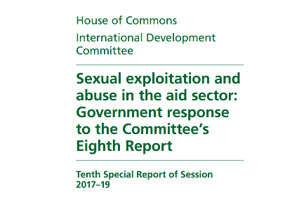The National Audit Office (NAO) has published a report criticising the government’s failure to measure the effectiveness of its funding for international development programmes.
NAO’s report praises the government for meeting its commitment to spend 0.7 per cent of its gross national income on Official Development Assistance (ODA) since 2013, spending £14.1bn in 2017.
It also says that government departments have put in place structures to support target setting and performance assessment.
However, it says the government “has placed insufficient emphasis on demonstrating its effectiveness and on progress” against the UK Aid Strategy, which was published in 2015.
It says: “The NAO found that government has only just started to consider the effectiveness of ODA expenditure across departments and what this says about progress in implementing the UK Aid Strategy.”
While the Department for International Development (DfID) still spends the majority of ODA, the government has channelled more of it through other departments in recent years, with 28 per cent spent by other bodies in 2017.
The report says this wider allocation of ODA has created “additional risks”, with departments less experienced in aid possibly not challenging the value for money of the spending “as rigorously”.
It says: “Neither DfID nor HM Treasury has assessed whether allocating the ODA budget to departments other than DfID has had the impact intended.”
The report says departments need to improve the transparency of their ODA expenditure, casting doubt on the government’s ability to meet its target of each department being independently assessed as “very good” or “good” in terms of transparency by 2020.
It also says the impact of Brexit on the government’s aid spending “remains unclear”.
Gareth Davies, the head of the NAO, said: "Government does not know whether giving responsibility for spending ODA to a larger number of departments has had the impact it intended. And its progress in improving the transparency of spending has been slow.
"While there is good evidence that many aid programmes are securing an impact individually, government does not know whether all parts of ODA, taken together, are securing value for money.”
Sector: DfID should do more
Jon Date, head of government relations at Oxfam, said the government’s lack of transparency risked undermining its aid efforts.
He said: “DfID is a world leader in reducing extreme poverty – providing urgent, life-saving relief for millions of people in serious need around the world. We share the NAO’s concern that the increasing proportion of the aid budget spent by other departments – and their lack of transparency – risks undermining UK aid’s effectiveness in helping people most in need.
“As the department with the best track record in both tackling poverty and being accountable for how money is spent, it is vital that DfID not only continues to lead the delivery of the UK aid budget, but also has a greater role in overseeing aid spent by other departments.”
Claire Godfrey, head of policy and campaigns at umbrella group Bond, said development secretary Rory Stewart should have oversight of all aid spending.
She said: “DfID should review the effectiveness of ODA being spent by other government departments and cross-government funds.
“It is also essential that the secretary of state for international development has oversight for all ODA. This is the best way of ensuring that aid is used to improve the lives of the world’s poorest people so we can continue to champion our record on poverty reduction on the international stage.”
Government response
The government said it was working to improve its impact measurement and transparency.
A spokesperson said: “We welcome the scrutiny of the National Audit Office, and are already addressing some of the key points raised in its report.
“Aid spending departments work together to share best practice on project design and delivery, and transparency, and DfID and the Treasury are developing a system to more effectively track how aid is spent across the whole of government.”
|
Related articles












